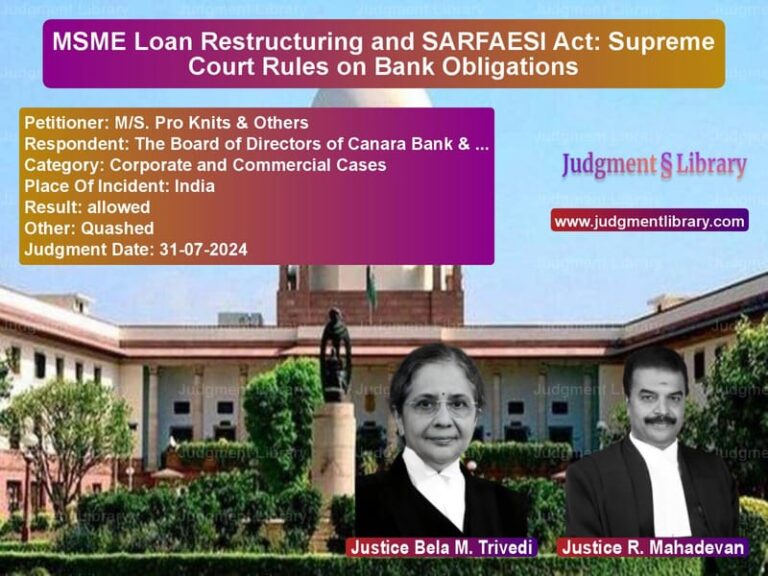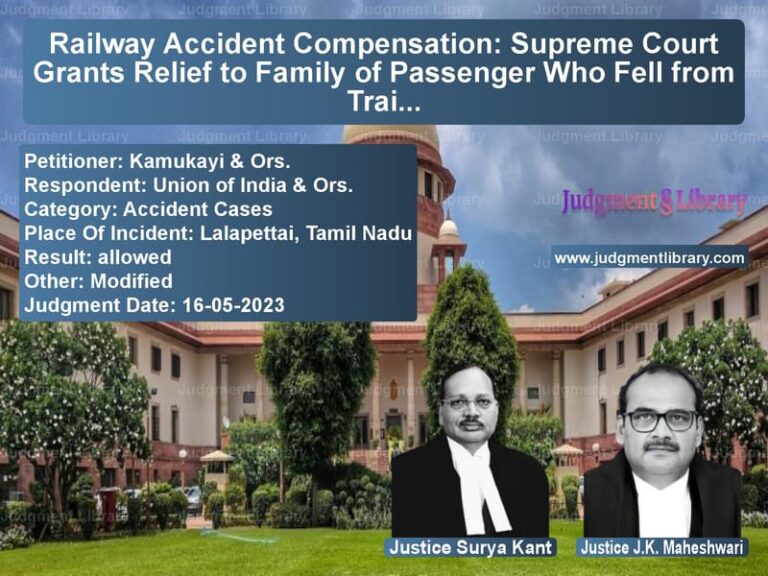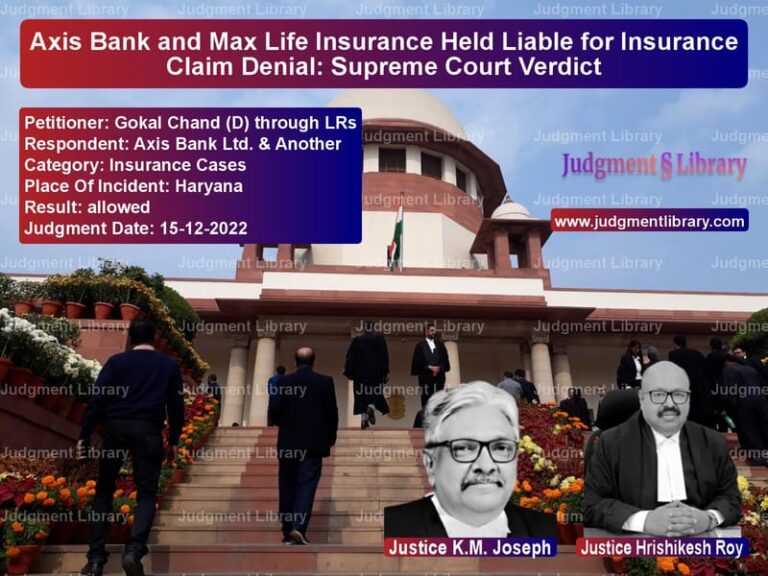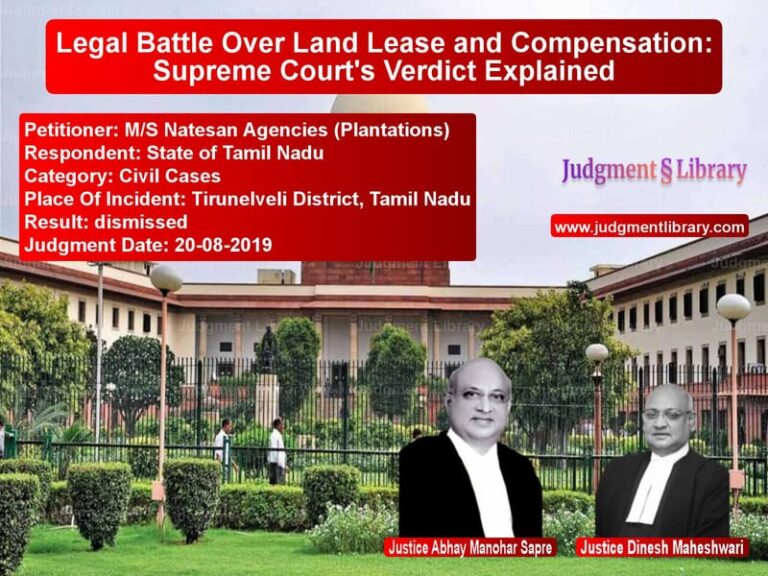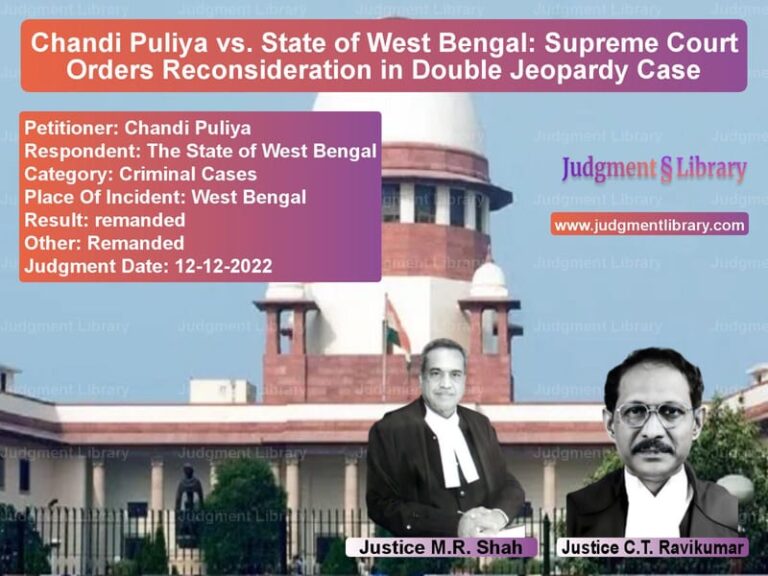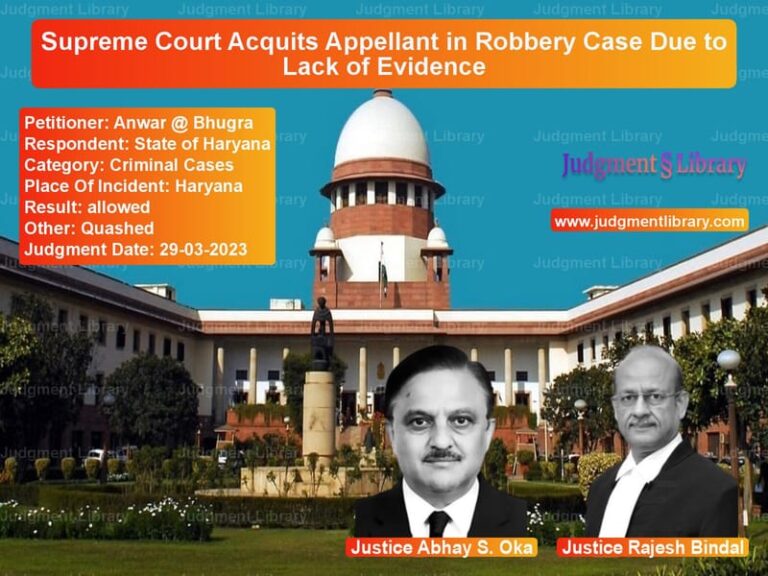Supreme Court Cancels Anticipatory Bail in Bihar Murder Case, Directs Accused to Surrender
The Supreme Court of India, in a significant ruling, set aside the anticipatory bail granted by the Patna High Court to three accused in a gruesome murder case involving the burning of a 20-year-old man. The case, titled Shambhu Debnath v. State of Bihar & Ors., raised critical concerns over the improper grant of anticipatory bail in serious offenses like murder.
Background of the Case
The case stemmed from an incident on January 13, 2023, when the complainant, Shambhu Debnath, witnessed his 20-year-old nephew, Mukesh Kumar, being burned alive. Mukesh succumbed to his injuries on January 17, 2023. The accused individuals—Sindhu Devnath, Sanjit Devnath, Ratan Devnath (respondent no. 2), Lalita Devi (respondent no. 3), Sunil Devnath, and Rina Devi (respondent no. 4)—allegedly set Mukesh on fire after accusing him of having a romantic relationship with Sindhu Devnath’s daughter.
The police registered a First Information Report (FIR) under Sections 341, 323, 307, 504, and 34 of the Indian Penal Code (IPC), which was later modified to include Section 302 IPC after Mukesh’s death.
Legal Proceedings
- The accused initially sought anticipatory bail from the Sessions Court, which rejected their plea.
- The police filed a charge sheet affirming the accusations against all named individuals.
- The accused then approached the Patna High Court, which granted them anticipatory bail on July 25, 2023.
- Aggrieved, the complainant moved the Supreme Court, challenging the High Court’s order.
Arguments by the Petitioner (Complainant)
The complainant, represented before the Supreme Court, contended:
- The accused were granted anticipatory bail without due consideration of the gravity of the offense.
- The police investigation had already confirmed their involvement in the crime.
- The anticipatory bail order did not consider the Supreme Court’s established guidelines for granting pre-arrest bail in murder cases.
- The accused had been evading judicial proceedings, necessitating their custody.
Arguments by the Respondents (Accused)
The accused initially failed to appear before the Supreme Court despite service of notice. Their counsel, Mr. Amitava Poddar, later withdrew representation, citing instructions from the accused to not appear on their behalf. This raised suspicions about their intent to evade the judicial process.
Supreme Court’s Observations
The Court, in analyzing the case, cited its ruling in Sushila Aggarwal v. State (NCT of Delhi), emphasizing that courts must consider the following factors while deciding anticipatory bail applications:
“92.4. Courts ought to be generally guided by considerations such as the nature and gravity of the offenses, the role attributed to the applicant, and the facts of the case, while considering whether to grant anticipatory bail, or refuse it.”
Referring to the specifics of the case, the Supreme Court found the High Court’s decision to be unsound:
- There were direct allegations and sufficient material evidence against the accused.
- The High Court granted bail in a “cryptic and mechanical manner” without considering the charge sheet.
- The accused had attempted to evade judicial proceedings, necessitating their arrest.
Supreme Court’s Ruling
The Supreme Court set aside the High Court’s anticipatory bail order and directed the accused to surrender before the trial court within four weeks. It further allowed them to apply for regular bail, to be considered on its own merits without being influenced by the current ruling.
The Court sternly noted:
“We fail to understand how the High Court granted relief of anticipatory bail in an offense under Section 302 IPC, especially when the charge sheet found the case to be true against all accused persons.”
Implications of the Judgment
This ruling reaffirms the Supreme Court’s stance that anticipatory bail should not be granted in serious offenses such as murder without proper scrutiny. The key takeaways from the judgment include:
- High Courts must adhere to Supreme Court guidelines while considering pre-arrest bail.
- Courts must take into account charge sheet findings and the accused’s conduct before granting relief.
- In murder cases, anticipatory bail should only be granted under exceptional circumstances.
Conclusion
The Supreme Court’s ruling in Shambhu Debnath v. State of Bihar sends a strong message against the misuse of anticipatory bail provisions in serious criminal cases. It highlights the judiciary’s responsibility to balance personal liberty with the need for justice, ensuring that accused individuals do not escape legal proceedings through procedural loopholes.
Petitioner Name: Shambhu Debnath.Respondent Name: State of Bihar & Ors..Judgment By: Justice Vikram Nath, Justice Prasanna B. Varale.Place Of Incident: East Champaran, Bihar.Judgment Date: 20-12-2024.
Don’t miss out on the full details! Download the complete judgment in PDF format below and gain valuable insights instantly!
Download Judgment: shambhu-debnath-vs-state-of-bihar-&-ors-supreme-court-of-india-judgment-dated-20-12-2024.pdf
Directly Download Judgment: Directly download this Judgment
See all petitions in Bail and Anticipatory Bail
See all petitions in Attempt to Murder Cases
See all petitions in Custodial Deaths and Police Misconduct
See all petitions in Judgment by Vikram Nath
See all petitions in Judgment by Prasanna Bhalachandra Varale
See all petitions in allowed
See all petitions in Quashed
See all petitions in supreme court of India judgments December 2024
See all petitions in 2024 judgments
See all posts in Criminal Cases Category
See all allowed petitions in Criminal Cases Category
See all Dismissed petitions in Criminal Cases Category
See all partially allowed petitions in Criminal Cases Category


